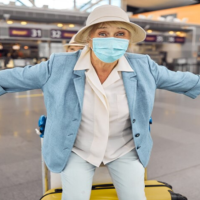Traveling is all about freedom and exploration.
For both of these ideas to be expressed fully, you need to throw caution to the wind and let the road take you where it wants to go.
But if you allow yourself to experience your journey carelessly, you can easily fall victim to scams, dangers, and misunderstandings.
Our simple safety tips will keep you out of harm’s way, allowing you to experience the wonders of the world.
We’ve included basic concepts to be aware of, things you should do before you start your trip, and suggestions to keep you safe during your travels too.

Contents
- Don’t Flash Your Valuables
- Know Common Travel Scams
- Know The Local Emergency Info
- Get Travel Insurance
- Never Take Illegal Drugs In A Foreign Country
- Avoid Traveling Alone At Night
- Get Your Travel Vaccinations
- Share Your Itinerary With Family and Friends
- Pack A First Aid Kit
- Stay Healthy: Food & Water Safety
- Be Aware of Your Surroundings
- Lock Up Your Valuables
- Ask Locals For Advice
- Don’t Share Too Much With Strangers
- Don’t Do Stupid Things For Photos
- Be Aware Of Your Clothing
- Learn Basic Self-Defense
- Tell Your Bank Where You’re Going
- Hide Emergency Cash
- Drink Responsibly
- Use The Right Bag
- Bring Travel Locks And Use Them
- Keep Digital Copies Of Important Documents
- Use Reputable Transportation Companies
- Use Apps For Emergency Alerts
- Summary
Don’t Flash Your Valuables
Whenever you go to a new country, there will always be criminals ready to swipe a tourist.
It doesn’t matter which country you go to, or which area you stay in, there will always be criminal activity.
If you leave your valuables on display, you will be telling these local criminals that you’re an easy target with a good stash.
Laptops on car seats, mobile phones in your back pocket, and wallets on the table are all indicators that you have wealth and are careless.
To avoid creating this persona, you should keep your valuables hidden from sight.
This could mean putting your wallet and phone in your zipped bag tucked under your arm.
Or perhaps keeping your hand in the pocket where your wallet lies.
When it comes to bulky items you should cover them or hide them out of sight.
Although your hotel room should be safe, you could bring your own safe or locked box with you on your travels to prevent in-house thefts.
Know Common Travel Scams
Although opportunity theft and pick-pocketing are common scams around the world, each location will have unique criminal behavior you should be aware of.
In areas of historical significance, you may find local scam artists selling tours for inaccurate information on the topic.
Bustling cities might have dodgy taxis with broken meters scamming you into paying more than you should.
To know what the common scams are, you need to complete an online search for your travel destination.
A simple search like “Common Scams In XXX” or “How To Be Safe In XXX” can teach you what to expect in that area.
Once you arrive at your vacation destination, ask the local hotel workers and traveling companions about known scams.
People who live in the area will be more aware of the simple ways to avoid crime.

Know The Local Emergency Info
For every new place you go to, you need to create an emergency plan.
This plan should contain phone numbers for emergency services (such as the police, ambulance, or fire brigade).
It should also include the likely cost to use the local hospitals, the location of the hospitals, and the language these services use.
Having this information to hand can help you stay focused, should the worst happen.
We also recommend noting where the local postal service is, and the name and address of your hotel.
This way if you become confused or lost you should be able to find your hotel and a postal service to contact them or your family.
Lastly, you should keep your important documents in digital format on a secure USB thumb drive that never leaves your sight.
This way if your passport becomes lost or stolen, you have a digital copy to help you prove your identity.

Get Travel Insurance
Insurance is one of the most “sod’s laws” necessities you should consider.
You will probably never need it, but if you travel without it you’ll be at risk of losing your possessions, developing health issues, and collecting a mountain of debt in the process.
With travel insurance, all of your possessions will be protected if they are stolen or become lost.
This means the original items will continue to be lost, however, the financial aspect of buying new items will be taken care of by your company.
It also means that if you become ill or injured while away, the insurance company will pay for your medical bills.
Make sure to read the details on the insurance contract, as each company will only cover specific elements.
For instance, if you are exploring a landlocked country, there will be no need to purchase insurance against aquatic animal injuries (like sharks).
Never Take Illegal Drugs In A Foreign Country
This might seem like a “no-brainer”, but remedies and medication considered legal in one country may be illegal in another.
A simple example of this is medical marijuana.
In the United States alone, 37 states allow the legal use of medical marijuana, leaving 12 states completely rejecting the drug.
The United States legal breakdown is unique, due to the 50 states all having their unique laws.
Around the rest of the world, just 50 countries allow the legal use of medical marijuana but many of them have caveats to this agreement.
You may think the simple solution to this issue is to avoid using marijuana when you travel, but just like any medication, this can lead to ill health and may not be a viable option.
Instead, you should consider your destination’s laws before preparing to travel there.
Even common medications such as Benadryl, Codeine, Sudafed, and Adderall might be considered illegal in the country you are traveling to.
To make sure you don’t accidentally break a law, you should note all of the mediation you plan to take and use a search engine to see if they are illegal at your travel destination.
Avoid Traveling Alone At Night
You should never travel alone at night.
Even if you are in your hometown, traversing streets you have known your whole life, you should never be walking in the dark on your own.
During this twilight, you are more likely to be robbed or physically harmed as fewer people will be around to see the incident.
When you’re traveling, this issue can be made worse
Not only is the darkness hampering the vision of any passersby, but you don’t know where to run away.
You won’t know the area well enough to find safety, and even worse, your assaulters know every direction you might take.
Taking a less cynical point of view, traveling alone at night can also lead to getting lost.
You won’t know where you’re going in general, as the new location will take a while to decode, but in the dark, your surroundings will feel even more foreign.
During this darkness, you might fall and break your leg or end up unable to reach your hotel.
If you’re with a friend, you will be less likely to be targeted for a crime, and if an accident does happen, someone will be with you to help.

Get Your Travel Vaccinations
Every country in the world has its own viruses and diseases to battle.
You may have had your shots for every worrisome disease in your own country, but that doesn’t mean you’re protected against contagions in another.
Before you travel to a country, you may be asked to update your vaccination history.
For example, many countries in Africa require tetanus shots, typhoid shots, yellow fever, and hepatitis shots to prevent the spreading of these illnesses.
Look through the database on the Center for Disease Control and Prevention, to see which vaccinations you need before you travel.
It doesn’t matter if you’re going on a short weekend trip or a month-long vacation, you should tell your friends and family where you are going and when they should expect you back.
This isn’t so you can show off your exciting plans, it’s so they can help if something goes wrong.
If a natural disaster happens in a location you’re visiting, and you fail to answer their calls, they will know which hotel to contact to find you.
They can also inform the location police force about you, adding to the missing person list.
Secondly, if you went missing on your tour, they will know which route you had taken and can narrow down when you were last seen.
With a smaller search area, it will be easier to find you.
You can use the US Government Smart Traveler Enrollment Program to log your whereabouts and get updates on natural disasters in your travel area.
If you end up traveling to one of these spots, your family gets notified of the issue and the U.S Embassy will be aware of your situation.

Pack A First Aid Kit
A first aid kit is the bread and butter of any traveler.
Little injuries like a cut on the leg, bug bites, and stomach problems can all be soothed with the magic inside your first aid kit.
Taking it with you will allow you to tend to wounds or protect them until emergency services arrive.
You can buy small or basic versions of a first aid kit, which include pain relief, bug repellents, bandages, plasters, and diarrhea tablets.
You can create your own first aid kit, by gathering these supplies yourself and putting them in a waterproof container.
Creating your own first aid kit will allow you to use a container that fits into your bag perfectly.
This might be a better option for people with limited space on their travels.

Stay Healthy: Food & Water Safety
When you travel to new locations, one of the best exploration treats is trying the local food.
Even though eating unusual foods can be super exciting, your body might not be ready for the change in food preparation.
Just as different countries have different bacteria and diseases, the people of the culture will be better prepared to eat different foods.
Just as someone who eats chilis in every meal can handle the heat, a person on plain chicken will cry just by looking at spices.
Different cooking techniques might create a perfect meal for a local, but cause you gastric distress.
To avoid getting ill, you should follow this mini-guide:
- Eat at popular places – Long queues mean respected and loved food. You can trust that these places will serve their cuisine to a good standard.
- Watch the food being prepared – This can be hard to achieve, but if you notice a restaurant with viewable chefs, pick them. You can see how clean the kitchen is, and how long they cook the meats and be aware of any hygiene issues you aren’t okay with.
- Pack translation cards – If you’re allergic to something, make a translation card that explains the issue. You should laminate the card and show it to your waiter. This will help communicate any foods you need to avoid.
- Opt for fully cooked meals and peelable fruits – Raw chicken is a common ingredient in Asian countries, however, it can lead to salmonella. In the US we don’t eat chicken raw so our bodies will not be able to handle raw chicken as the locals can. Peelable fruits keep away bacteria, as the peel is a barrier to protect the fruit.
- Buy a filtered water bottle – an easy way to get bacteria and diseases into your body is by drinking unfiltered water. Most cities have an embedded filtration system in their waterways, however not every location has the same technology. To avoid developing diarrhea, put all of your water in a filtered water bottle.
Be Aware of Your Surroundings
When you’re exploring it can be easy to get lost.
Everything is new around you, and although you’re taking it all in, the amount of new information you’re digesting means locations and spatial awareness will become confusing.
To stop yourself from getting lost, you should make a note of all of the landmarks on your path and the direction you have been going.
If you tend to forget mental notes, send yourself a message on your phone
You can even take a photo to help with the visual aspect of remembering.
The photo idea is super helpful in areas that look very similar to each other.
Lock Up Your Valuables
A good hotel will make you feel like you’re walking around your own home.
This level of safety should be reflected in actuality too.
However, thieves know that tourists put a lot of trust into their hotels, which means you’re likely to leave your room unlocked or allow your valuables to lay disheveled in your rooms.
To avoid these types of thieves, you should ensure your luggage is locked away.
Make sure you lock your door behind you, and if the hotel offers a locking storage system utilize it.
Hostels often supply a storage container by your bed but don’t offer a lock.
If by any chance your belongings are locked in the hotel’s safe and you are unable to unlock them, contact the hotel’s front desk, do not contact a private locksmith for this type of thing.
In these cases, buy your own.
Ask Locals For Advice
We have already suggested talking to locals to learn about common criminal threats in the area, but you should also ask strangers for their advice on local outings.
If a certain street is rough, a particular taxi driver overcharges or a local restaurant had issues with rats not too long ago, then the locals will know all about it.
You shouldn’t just trust one person’s opinion though.
Everyone will have their own ideas of good and bad places, but if you start to hear a pattern of negativity, then be sure to avoid those areas.
Although you should talk to the locals and ask for advice, remember that you shouldn’t be sharing too much information with strangers.
Telling a random person about your travel plans, the hotel you are staying at, or the length of your stay can allow them to judge if you’re worth stealing from.
This same advice applies to your social media too.
Telling strangers that you’re away from your home is an invitation to attempt a robbery.
Strangers use this information to know your home is unprotected and an easy target.
To avoid sharing this information, you should upload pictures and vacation information after your trip has concluded.
Don’t Do Stupid Things For Photos
Although photos and videos can produce high-view content, and a lot of fun memories, you don’t want to end up in the hospital trying to capture the perfect picture.
Unfortunately, many social media-hungry people take photos at the edge of cliffs in an attempt to capture adventurous moments.
This often leads to accidents and injuries as the cliffs crumble under their weight.
Instead of putting yourself in harm’s way, take a photo or video of a candid moment.
This captures your adventurous spirit more naturally and allows you to remember the actual fun moments in your travels.
Be Aware Of Your Clothing
One of the best ways to avoid looking like a tourist is to wear clothing that matches the culture around you.
You don’t need to don a traditional outfit or appropriate religious clothing, but wearing one large sweater instead of multiple layers of clothing while in a cold country is a sure sign that someone isn’t used to the climate.
And as we know already, showing yourself as a tourist tells the thieves you’re an easy target.
As well as avoiding thieves, you also need to be aware of the cultural differences between clothing and country, as well as the laws.
For example, many Islamic countries require women to cover their faces and body.
Not adhering to this law may cut your vacation short due to arrests.
Before you travel you should see what your destination expects from its tourists.
For example, Barcelona doesn’t allow anyone to walk around without a top.
Although women around the world have to adhere to this rule already, many men aren’t used to this restriction.
If you’re caught, you can be fined up to €300.

Learn Basic Self-Defense
This tip might seem a little extreme, but if you plan on going traveling by yourself it is a great option to feel safe while alone.
Ideally, you should never be in a physical confrontation.
Learning how to complete self-defense doesn’t mean attacking someone because they have upset you.
Being rejected from a club, being charged a high fee, or being offended by someone’s actions are not viable reasons to enact self-defense procedures.
Instead, these classes should be used to neutralize a situation and allow you to run away.
Take a couple of classes to learn the basics and give yourself the self-believe that you can handle yourself if your trip turns sour.
Tell Your Bank Where You’re Going
This tip may not seem like a safety issue but it can easily get you stranded if ignored.
Banks monitor the use of your account to ensure that money laundering and fraud haven’t been committed.
When you travel to a new location and start using your card, your bank will know that something new has occurred.
If they believe this transaction is suspicious, they might freeze your account.
With your accounts frozen, you’ll need to go into a branch to re-open it.
In the meantime none of your direct debits can be used, nor can you use your card.
This means you won’t be able to get cash while abroad.
To avoid this situation, you simply need to tell your bank where you’re traveling.
Then, when you spend time in that country or state, they will recognize legitimate behavior.
Hide Emergency Cash
Of course, some banking systems are automated, and human error can always play a factor in life.
If your bank does freeze your accounts, you should be safe if you already have an emergency cash stash.
Emergency cash is simply another way to carry your money, but making it physical and untouched allows you to have “wiggle room” should you need it.
Your wallet might get stolen or become lost, and you may be targeted by pickpockets.
If you hide around $200 in a hidden compartment of your pants or roll it in an empty chapstick container, then thieves will not be able to find your money.
This allows your emergency cash to stay hidden, meaning you always have some cash to hand.

Drink Responsibly
Enjoying the local nightlife while you travel can be a wonderful way to make friends with other travelers and locals alike.
However, when you are intoxicated you are more likely to forget your place.
What might be seen as simple tomfoolery in your country of origin, could be seen as a horrific act in another.
Managing your understanding of a new culture while drunk can be extremely difficult, so to avoid misunderstandings you should drink responsibly.
Another reason to slow down on the beverages is your vulnerability.
Not only are you likely to get lost while intoxicated in an unfamiliar country, but you’re also likely to be robbed or worse.
This doesn’t mean you shouldn’t experience drinking culture on your travels, but you should be aware of how much you are drinking, where your belongings are, and where your hotel is.
As a rule of thumb, you should never put your drink down. Keep an eye on it at all times.
Use The Right Bag
The right bag for your journey should be viewable, within easy reach of your hands, and cannot be taken from your body without clear knowledge.
Lots of people opt for the rucksack option, as the straps go over your shoulders and between the armpits, meaning removing them from you will take a lot of effort.
However, you cannot see your rucksack while you wear it, as the zips and containment structure are on your back.
To make rucksacks safer, you may want to wear them on your front instead.
This isn’t the most comfortable option but at least your bag is firmly attached to your body, and you can see anyone attempting to open it.
The most common form of handbag is an over-the-shoulder accessory.
Although you can see these bags easily, as they swing by your hip, they are just as easy to take.
In fact, many users get frustrated at how easily they can slip off your shoulder.
The best bag for traveling is a cross-body bag.
Like a handbag, you can easily see if anyone tries to open the contents without your permission, and like a rucksack, they are firmly strapped to your body.
They are the best of both worlds.

Bring Travel Locks And Use Them
We have already talked about buying your own lock if the hotel or hostel doesn’t provide one for you, but you can use these locks on more than just a safe or crate.
Putting a lock on your backpack as you chain it around your seat on a train, can help a solo traveler feel safe enough to sleep if they cannot fight the feeling any longer.
A simple hack like this can help you feel secure on a long journey through a packed train too.
Simply buy a chain and a couple of locks.
The first lock is to chain it to your seat, the second lock is to prevent the bags from opening.

Keep Digital Copies Of Important Documents
We’ve briefly mentioned keeping digital copies of your important documents and carrying them on a USB stick.
The idea behind this is to keep your identity documents on hand if they get stolen or lost.
However, you should do this with other documents too.
Your hotel booking, airline tickets, activity bookings, and more should be kept in a separate folder of your email address or on the USB stick.
This way you’ll find your important information easily and without hassle.
If you don’t create digital copies, then you may end up relying on your memory or the staff’s ability to log details correctly.
Email confirmations will contain customer numbers, so if they noted your name down incorrectly, the customer number will ensure your booking is still secure.
Use Reputable Transportation Companies
Another way to avoid losing your booking is to research the companies you are using first.
Picking well-known and respected taxi companies such as Lyft or Uber will allow you to make a booking securely knowing that your money will not be taken from you without first receiving the service.
This can be said for all types of companies, but in the transport industry finding someone reputable is key.
Taxi rides can easily become a scary journey if you jump into a car without research.
They could take you anywhere, and you wouldn’t know the location was wrong until it was too late.
Using an established company with a searching feature (like Lyft and Uber do), can give you the confidence that the prices are fair and your safety is secure.
Use Apps For Emergency Alerts
Lastly, we have mentioned emergency alerts briefly already, however, the Smart Traveler is used for American tourists only.
Ideally, you should also download an app for the area you will be traveling to too.
The local apps will be able to indicate road closures, known laws which are often unknown to travelers, and the information for local emergency services.
You can also find apps that help solo travelers meet with each other safely.
They allow family members and friends to know when you are meeting, and who the person you’re meeting is.
This way you can both feel comfortable knowing that this person can be tracked if you go missing.
Of course, these emergency apps may not be used or needed on your travels, but having them will allow you to feel safe and knowledgeable about the area around you.
Summary
It will be hard to memorize all of these tips, but you need to be aware of them to stay safe on your travels.
Whenever you decide to travel, read through this list to remind yourself about our key points.
First, you should prepare your pre-travel safety measures such as getting travel insurance, learning self-defense, and buying the right bags and first aid kit.
Then when you arrive make sure to keep your valuables safe, ask the locals about areas to avoid, and drink responsibly.
Keep this in mind, and you should be prepared for any issue that comes your way.











